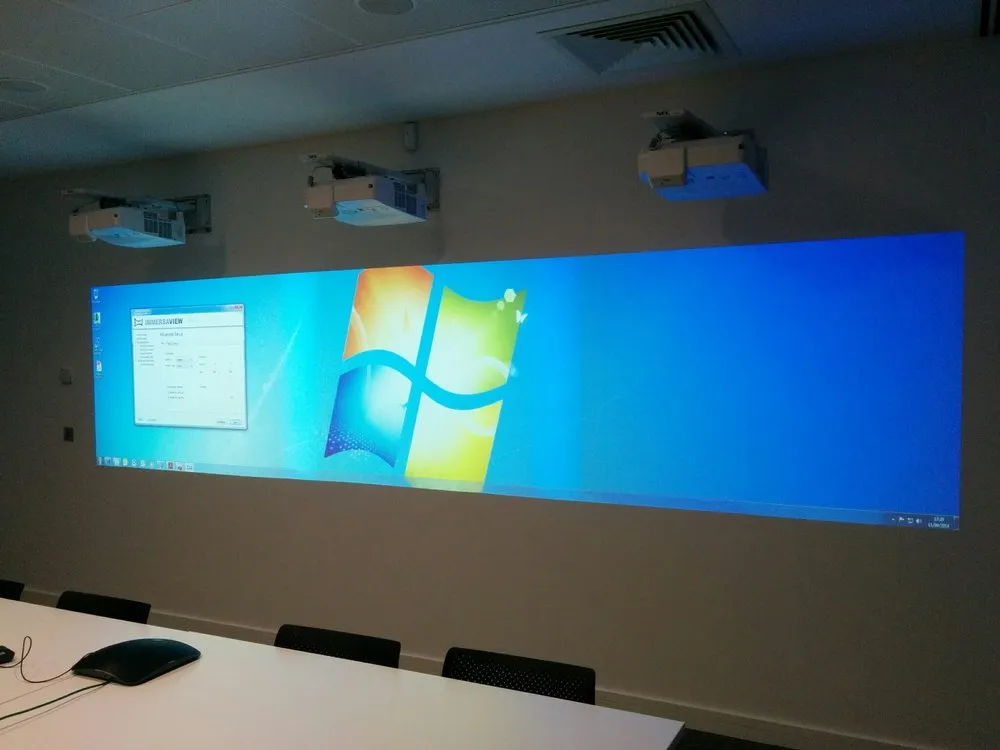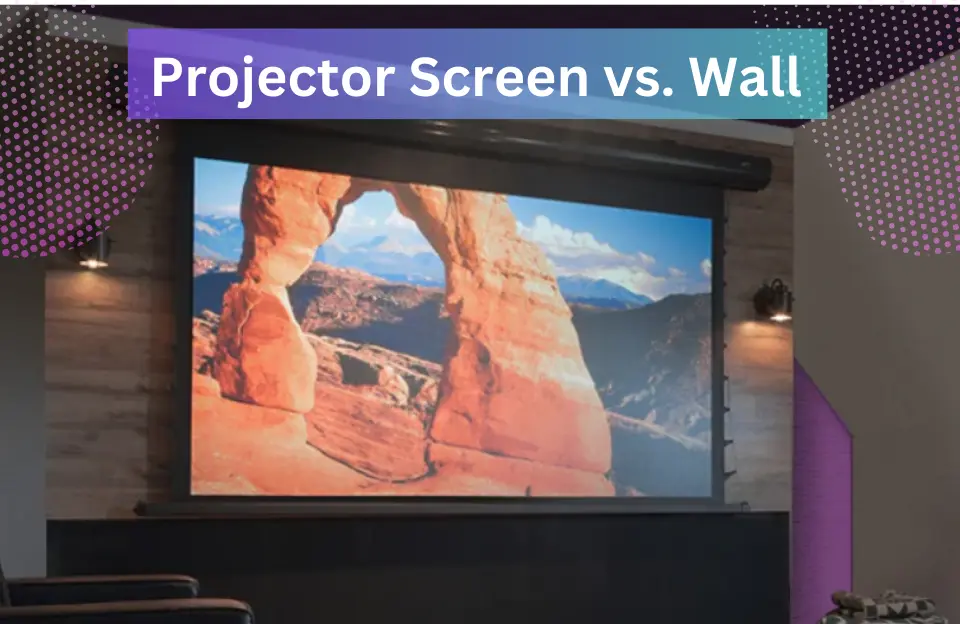Home entertainment has become more immersive and engaging than ever before, Isn’t it? Yes, with advancements in technology, we now have the luxury of enjoying movies, TV shows, and video games on larger screens with better picture quality.
When it comes to setting up a home theater or a presentation space, one of the key decisions is whether to use a projector screen or a bare wall for displaying the content. Both options have their advantages and drawbacks, but which one truly delivers the perfect viewing experience?
In this article, we will explore the differences between a projector screen vs. wall, highlighting their pros and cons. By the end, you will have a better understanding of which option suits your needs and preferences.
Understanding Projector Screens
A projector screen is a specialized surface designed explicitly for projecting images. It typically consists of a fabric material that optimizes the reflection and diffusion of light to enhance image quality. Projector screens come in various types, including fixed-frame screens, retractable screens, motorized screens, and portable screens.

Types of Projector Screens
Projector screens come in various types, including fixed frame screens, motorized screens, portable screens, and retractable screens. Fixed frame screens provide a sturdy and permanent display solution, while motorized screens offer convenience with their automated deployment.
Portable screens are lightweight and easy to transport, making them ideal for presentations on the go. Retractable screens provide the flexibility to hide the display when not in use.
Top 5 Premium Quality Projector Screens
- Mdbebbron 120 inch Projection Screen 16:9
- HYZ Large Indoor Outdoor PVC Movie Projection Screen
- HOIN Projector Screen with Stand 100 inch 16:9
- PropVue Projector Screen with Stand 100 inch
- Vamvo 100 inch Portable Foldable Projection Screen 16:9
Benefits of Projector Screens
Enhanced Image Quality
One of the primary advantages of using a projector screen is the significant improvement in image quality. The specialized screen surface is designed to reflect light evenly, resulting in sharper and more vibrant images. This enhanced image quality is especially noticeable in dark or controlled lighting environments.
Improved Viewing Experience
Projector screens offer a superior viewing experience compared to walls. They are designed to optimize the projection angles, ensuring that the projected image is evenly distributed across the screen. This feature eliminates image distortions and ensures that every viewer in the room has an optimal viewing experience.
Adjustable Screen Size
One of the significant advantages of using a projector screen is the ability to adjust the screen size according to your preference and space limitations. Screens are available in various sizes, allowing you to choose the perfect size for your room. Whether you want a smaller screen for intimate movie nights or a larger one for immersive gaming sessions, a projector screen offers the flexibility to cater to your specific needs.
Portability and Flexibility
Projector screens are designed to be portable and easy to set up. They are lightweight and often come with a carry bag, making them convenient for transportation or moving between different locations. This flexibility allows you to enjoy a cinematic experience wherever you go, whether it’s in your living room, backyard, or even during a business presentation at a different venue.
Drawbacks of Projector Screens
Cost
One significant drawback of projector screens is their cost. Compared to projecting onto a wall, purchasing a quality projector screen can be more expensive. Additionally, if you opt for motorized or retractable screens, the installation and maintenance costs may further increase.
Limited Size Options
While projector screens come in a range of sizes, they do have limitations. If you have a large space and require a massive screen, you may face restrictions due to size availability or budget constraints. On the other hand, projecting onto a wall allows for virtually unlimited size options, provided you have a suitable blank space.
Installation Complexity
Installing a projector screen can be more complex than simply projecting onto a wall. Fixed-frame screens require accurate measurements, proper wall mounting, and tensioning of the screen material. Motorized screens may involve electrical wiring and additional installation steps. This complexity can be a disadvantage for those seeking a quick and hassle-free setup.
Projecting onto Walls

Using a wall as a projection surface is a common practice, particularly in casual settings or temporary setups. It offers simplicity and convenience, eliminating the need for a dedicated screen.
Advantages of Wall Projection
Cost-Effectiveness
Compared to projector screens, projecting onto a wall is cost-effective. It eliminates the need to purchase a separate screen, saving you money. If you already have a smooth, light-colored wall available, utilizing it as a projection surface can be a budget-friendly solution.
Convenience and Accessibility
Wall projection is highly convenient and accessible. You can project your content onto any suitable wall without the need for additional setup or equipment. This flexibility makes wall projection ideal for impromptu gatherings, outdoor movie nights, or presentations on the go.
Seamless Integration
Using a wall as a projection surface seamlessly integrates with your existing space. It blends into the room’s aesthetics without requiring any additional installations or modifications. This integration can be advantageous when you prefer a discreet or minimalist setup.
Suitable for Small Spaces
In situations where space is limited, utilizing a wall as a projection surface can be a practical choice. It eliminates the need for additional equipment and frees up valuable floor space that would otherwise be occupied by a projector screen and its supporting structure. This advantage makes it suitable for apartments, dorm rooms, or any area where maximizing space is crucial.
Limitations of Wall Projection
Image Quality Compromises
When projecting onto a wall, image quality may suffer compared to using a dedicated screen. Walls are not optimized for reflection and diffusion of light, resulting in potential color inaccuracies, reduced contrast, and loss of fine details. Additionally, imperfections on the wall’s surface, such as texture or unevenness, may affect the image projection.
Lack of Versatility
Unlike projector screens, walls do not offer the same versatility. You are limited to the available wall surfaces, which may not always align with your desired screen size or aspect ratio. If you require flexibility in screen size or frequently change projection locations, a wall may not be the most suitable option.
Ambient Light Interference
Walls are susceptible to ambient light interference, especially in bright environments. The presence of external light sources can diminish the projected image’s visibility and clarity. Projector screens, on the other hand, are designed to minimize ambient light reflection, allowing for a more focused and vibrant image even in challenging lighting conditions.
Related: Do Projectors Emit Blue Light?
Which One Delivers the Perfect Viewing Experience?
Choosing between a projector screen and a wall for your viewing experience involves considering various factors such as image quality, convenience, budget, and room aesthetics. You can assess the below points to determine which option will deliver the perfect viewing experience for you.

Purpose and Environment
Consider the intended use of the projection setup. Are you setting up a dedicated home theater? Or is it a temporary arrangement for occasional movie nights? Additionally, assess the lighting conditions and ambient light sources in the room or outdoor area where the projection will take place.
Related:
- 4:3 vs 16:9 Projector Screen
- What Contrast Ratio is Good for a Projector?
- What is a Good Amount of Lumens for a Projector?
Desired Image Quality
If you prioritize image quality, a dedicated projector screen is the preferred choice. These screens are designed to optimize picture clarity, color accuracy, and contrast. They offer a smooth and flat surface without any distortions, resulting in a more immersive and enjoyable visual experience. Walls, however, may introduce various imperfections that can compromise image quality.
Lighting Conditions
One crucial factor to consider is the lighting conditions in the viewing area. If you have full control over the ambient light, such as in a dedicated home theater room, a projector screen can provide optimal image quality. On the other hand, if the room has large windows or bright lighting that cannot be easily controlled, a wall might be a more practical choice.
Required Viewing Distance and Angle
The distance between the projector and the screen or wall, along with the viewing angle, plays a crucial role in the viewing experience. Projector screens offer a wider viewing angle, allowing a larger audience to enjoy the content without compromising image quality.
Walls, on the other hand, may have a limited viewing angle and can result in reduced image quality if viewed from extreme angles. Consider the seating arrangement and the number of viewers when deciding between a screen and a wall.
Ambient Noise
Projector screens do not directly impact ambient noise levels. However, if you opt for an electric or motorized screen, the mechanical components might produce some noise during operation. Walls, being passive surfaces, do not introduce any additional noise. Take into account the acoustic requirements of your room and the potential noise generated by the screen mechanism, if applicable.
Consider Aesthetics and Room Decor
The visual appearance and the overall aesthetics of your room are important factors to consider. A projector screen can create a dedicated theater-like atmosphere, enhancing the cinematic experience. On the other hand, a wall projection can seamlessly blend with the room’s existing design, maintaining a cohesive look. Evaluate your personal preferences and the overall style you want to achieve in your space.
Flexibility and Portability are also Important
If you require a display solution that can be easily moved or adjusted, portable projector screens offer unmatched flexibility. These screens are lightweight, compact, and simple to set up, making them suitable for mobile presentations or outdoor movie nights. Walls, being fixed, lack the portability factor and are better suited for permanent setups.
Budgetary Constraints
Evaluate your budget and determine how much you are willing to invest in the projection setup. Projector screens can range in price depending on their size, type, and quality. Conversely, projecting onto a wall is a cost-effective alternative, as it requires no additional expenditure on a screen.
The Perfect Viewing Experience

Immersion and Engagement
To create an immersive and engaging viewing experience, a projector screen is the ideal choice. The dedicated screen surface enhances the sense of immersion by filling your field of vision with the projected content. This immersive experience is particularly beneficial for movies, sports events, or gaming sessions where you want to be fully engrossed in the visuals.
Image Clarity and Detail
Projector screens excel in delivering superior image clarity and detail. The smooth screen surface eliminates any texture or irregularities that may be present on a wall, resulting in a sharper and more precise image. This is especially noticeable in scenes with intricate details, fine text, or high-resolution content.
Projector Screen vs. Wall: Size and Aspect Ratio
Choosing a projector screen allows you to tailor the size and aspect ratio of the display to suit your preferences. Whether you desire a smaller screen for intimate viewing or a large screen for a cinematic experience, projector screens offer versatility in size options. With walls, you are limited to the existing surface area and may need to compromise on the desired aspect ratio.
Recommended:
- How To Clean A Projector Screen (Top Secrets Revealed!)
- Learn How To Hang A Projector Screen Like A Pro!
- Is A Black Projector Screen Better?
- Projector In Basement: Turn Your Basement into a Home Theater Haven
- Best Cheap Projector For PowerPoint Presentations
Projector Screen vs. Wall: FAQs

Can I use any wall for projection?
Ideally, it is recommended to use a smooth, light-colored wall for projection to achieve better image quality. Dark-colored walls or walls with imperfections may impact the projected image.
Is a projector screen better than a wall?
Projector screens are designed to optimize image quality, color accuracy, and contrast, providing a more immersive viewing experience. They offer a smooth surface without distortions and can mitigate the impact of ambient light.
Walls, on the other hand, may have imperfections that can compromise image quality and are more susceptible to glare and reflection.
Are projector screens difficult to install?
Installing a projector screen may require some technical knowledge and effort. It involves securely mounting the screen and ensuring proper tension for optimal performance. However, with proper guidance and instructions, it can be a manageable task.
Can a projector screen be used outdoors?
Yes, there are projector screens specifically designed for outdoor use. These screens are usually made of durable materials and can withstand outdoor conditions, allowing you to enjoy projections in an outdoor environment.
Do projector screens work well in brightly lit rooms?
Projector screens with high gain and ambient light rejection capabilities can mitigate the impact of bright environments on image quality.
Do I need to buy a specific type of paint for wall projection?
No, specific paints for wall projection are not necessary. However, if you choose to paint a wall for projection, it is recommended to use a matte or flat paint finish, as glossy finishes can cause unwanted glare and reflection.
Can I achieve a cinema-like experience with a wall projection?
While projecting onto a wall can provide a satisfactory viewing experience, it may not replicate the same level of image quality and immersive experience as a dedicated projector screen. If you seek a true cinema-like experience, investing in a high-quality projector screen would be advisable.
Do projector screens require maintenance?
Projector screens are relatively low-maintenance. Regular cleaning with a soft cloth is usually sufficient to keep them in good condition.
In a Nutshell
In the debate between projector screens and walls as display surfaces, both options have their merits. Projector screens provide a dedicated and optimized surface for projection, delivering enhanced image quality, customization options, and an immersive viewing experience.
On the other hand, walls offer convenience, cost-effectiveness, and blend seamlessly into the room decor. The choice ultimately depends on your specific requirements, lighting conditions, and the level of image quality you seek. Thanks For Reading!
As an experienced Software Engineer in a Projection-Based Technology Company, I love sharing my Knowledge to utilize and help others to learn more about Projectors. Thus one can get the right Projector for their needs.



